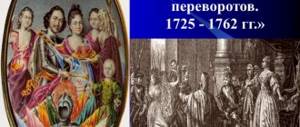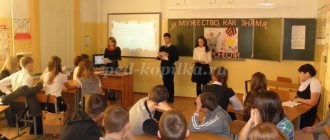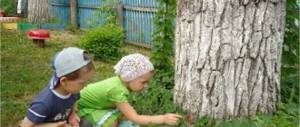Consultation for parents “How to raise a little patriot?” consultation on the topic
How to raise a little patriot?
My city is the best on Earth... On the entire huge blue Planet... Even if it is not so great in itself... There is no one more beloved in the whole world...
Vladislav Kernis Amelin
Fostering patriotic feelings in preschool children is one of the tasks of moral education, which includes nurturing love for loved ones, for kindergarten, for one’s hometown and for one’s home country.
Patriotic feelings are formed in the process of life and existence of a person located within a specific sociocultural environment. From the moment of birth, people instinctively, naturally and imperceptibly get used to their environment, the nature and culture of their country, to the way of life of their people.
It should be taken into account that a preschooler perceives the reality around him emotionally, therefore, patriotic feelings for his hometown, for his native country are manifested in a feeling of admiration for his city, his country. The formation of love for the Motherland begins with a mother’s song, with a picture in a book, with the corner where the children live.
V. A. Sukhomlinsky says: “It is impossible to awaken the feeling of the Motherland without perceiving and experiencing the world around us. Let the memories of a small corner of distant childhood remain in the baby’s heart for the rest of his life. Let the image of the great Motherland be associated with this corner.”
How to introduce children to moral and patriotic education?
- Children look at postcards and photographs of their hometown with curiosity and share their impressions. Give them this opportunity.
- If the child has building materials, you can invite him to build a house. When the house is built, play housewarming with your child, help place dolls, bunnies, and bears. See if the house is solidly built, beautiful, and comfortable to live in.
- When returning with your child from kindergarten, invite him to play the game “Who has noticed more interesting things?” “Let’s tell each other who has noticed more interesting things on our street. I see cars cleaning the street. What do you see? The game teaches observation skills and helps to form ideas about the environment. At home, invite your child to draw what they liked best.
- Preschoolers begin to show interest in the history of the country and region very early. If there are monuments in the city, organize excursions to them and tell them everything you know about how the memory of the dead is honored. You can make exciting trips around our city and throughout the Nizhny Novgorod region using photographs, and carry out virtual excursions using the Internet.
- Involve children in folk festivals, oral folk art, musical folklore, and folk games.
- Love for the Motherland is also love for the nature of the native land. Communication with nature makes a person more sensitive and responsive. In winter on skis, in summer on a bicycle or on foot, it is useful to go with your child to the forest to admire its beauty, the murmur of a stream, and the singing of birds. When cultivating love for their native land, it is important to teach a child to take care of nature and protect it.
Patriotic education of the younger generation is one of the most pressing tasks of our time. Huge changes have occurred in our country in recent years. Today, material values dominate over spiritual ones. However, the difficulties of the transition period should not become a reason for suspending patriotic education. Children should not have distorted ideas about patriotism, kindness, and generosity. The revival of the spiritual and moral education of the younger generation is a step towards the revival of Russia.
Consultation for parents “Patriotic education of children of senior preschool age in the family”
Through studying the history and traditions of our ancestors, pride and respect for our native land is fostered. An important role here belongs to fairy tales, which are passed down from generation to generation and teach kindness, friendship, mutual assistance and hard work. Original folklore is an excellent material that shapes love for the Motherland and the patriotic development of children. The child must have an understanding of state and national holidays and actively take part in them. It is also worth introducing them to the culture, customs and traditions of other peoples, and forming a friendly attitude towards them.
One of the manifestations of patriotism is love of nature. It is determined by a caring attitude towards it, expressed in elementary care for animals, in the accessible labor of growing plants. Walks in the forest, on the river, in the field are of great importance. They provide an opportunity to introduce children to some rules of caring for nature. When getting to know the nature of your native country, the emphasis is on its beauty and diversity, on its features. Vivid impressions about the native nature, about the history of the native land, received in childhood, often remain in a person’s memory for the rest of his life and form in the child such character traits that will help him become a patriot and citizen of his country.
An equally important condition for the moral and patriotic education of children is a close relationship with their parents. Touching the history of your family evokes strong emotions in a child, makes you empathize, and attentively pay attention to the memory of the past, to your historical roots.
To be a patriot of your country means to take its interests, concerns, sorrows and joys to heart, to feel responsible for everything that happens in it. Attitudes towards the homeland, its culture, history, and language are passed on from parents to children.
What a child of senior preschool age should know and be able to do
knows and states their first and last name, the first and patronymic names of their parents, where they work, how important their work is for society;
knows family holidays; has regular responsibilities at home;
can talk about his hometown (town, village), name the street where he lives;
knows that the Russian Federation (Russia) is a huge multinational country; that Moscow is the capital of our Motherland. Has an idea of the flag, coat of arms, melody of the anthem;
has ideas about the Russian army, about the years of war, about Victory Day.
Recommendations for parents.
The upbringing of a little patriot begins with what is closest to him - his home, the street where he lives, kindergarten.
Draw your child's attention to the beauty of his hometown
How to raise a patriot of your country
Patriotism is love for your country, and not hatred of others, it is important to convey this to your child. To instill patriotism in children, you need to start classes as early as three years old. Continue constantly, adding new introductions. At the “System-Vector Psychology” training, Yuri Burlan explains that it is easy to involve a child in any action. Whether a child will become a true patriot of his country largely depends on our efforts.
Here are some practical tips on how to raise a patriot of your country:
- It is sensual to read to children Russian epic tales about folk heroes - Ilya Muromets, Dobrynya Nikitich, Nikita Kozhemyak. If we don’t start doing this in time, the place of our real heroes will be taken by artificially created American ones. For example, Spider-Man.
- At an older age, arrange family viewings and discussions of films about patriotic heroes of the Great Patriotic War. When a child gets acquainted with the heroic deeds of people, he associates himself with them, he has a desire to be the same as them, to be able to do only the best deeds.
- Involve children to participate in military-patriotic clubs, games, and search parties. To help veterans. Children with skin vector will like this.
- Conduct historical colloquiums, where children independently prepare reports on the great Russian transformers - Peter the Great, Catherine the Second, who are a shining example of patriotism. This will especially captivate children with an anal vector.
- Organize family and school readings with discussions on historical and heroic topics of our Motherland. Now there are many interesting books of a historical and patriotic nature for the little ones. They are distinguished by clear language and interesting tasks that will captivate the child.
- Arrange a visit to local history and historical museums, where you can clearly see the glorious path of the country and its achievements. This will make the baby proud of his people.
- Participate with the whole family in the annual patriotic procession “Immortal Regiment”. The holiday provides an opportunity to feel unity, cohesion, strength and each other’s shoulder.
- Practice close family communication, drinking tea at a large table, when grandparents tell children how they lived before: they won the war with the whole country, saved other countries from fascism. And then everyone together restored their country. Children with an anal vector will enjoy such conversations. You can invite them to write a story based on such a meeting.
- Jointly attend sports competitions in team sports with your child: football, basketball, etc. Children with the skin vector will enjoy such events; they will support the team, “cheer,” merging into a single team with the players and fans.
- Be a patriot yourself, admire the country’s history and culture. A child has visual and effective thinking; only if we ourselves love our Motherland, then he will love it too.
- Discuss with your child cases from modern life where the heroism and patriotism of Russian people and compatriots are manifested.
- Stop the devaluation of your heroes. Explain to the child the real state of things. When history and heroes are devalued, the child becomes ashamed to belong to his country. He refuses the continuity of generations, his people, his homeland. Our task is to prevent this collapse.
- Arranging joint excursions around the city and around the country is a great way to raise children as patriots. Children with the skin vector love to travel. Children with a visual vector will pay attention to the beauty and grandeur of their native land.
How to raise a patriot of your country abroad
Many will ask why and whether it is necessary to raise a little patriot of one’s country while living abroad. Don't hesitate, it's necessary! Even far from your homeland you can be useful to it. It is we and our little children who, by our example, show the “Europeans” what kind of strange Russians they are.
Ordinary people often have a primitive, clichéd idea of our country. When you tell them first-hand about the Soviet Union, Russia, people, achievements, it is a revelation for them.
Those living abroad need to be triple patriots and also raise their young children to be patriots. All Russians are judged by how we behave. Each of us is the face of Russia.
Tips for parents living abroad on how to raise a child to be a patriot:
- The first language taught is Russian - speaking, reading, writing, right up to school. A little later, connect the language of the country of residence. Maintain the purity of the language - speak only your native language at home. Read classical Russian literature in your native language. Watch Soviet and Russian films in the original language.
- Constantly talk with your child about the Great Patriotic War. Walk with children in the “Immortal Regiment”. On Victory Day, invite grandparents with stories about their parents and grandfathers who went through the war.
- Take your child with you to the polls, even if you have to go to another locality to a polling station. Tell and explain how patriotism and pride for the country are manifested.
- It is very difficult, but important, to try to talk with children about politics, about the role of Russia, about the attitude of the whole world towards it. Especially in light of recent events, this is very difficult. The media is shouting about something completely different, peers “bring” to school the stamps of their mothers and fathers, imbued with an anti-Russian spirit, twitching, asking provocative questions. Only if a child is raised in the spirit of patriotism from childhood is he able to withstand such external onslaught.
Patriotism of parents and consistent upbringing will help a small child, and then an adult, to love and support their country even abroad.
Create a solid foundation in life for your child
The greatest negative attitude towards the country is among people with maximum frustrations, among those who were unable to realize their potential in Russia. They have the misconception that it will be easier for them abroad; they are expected there with open arms. The important role of parents is to be able to understand and correctly direct the child’s abilities so that in the future he can realize himself. Such a child will feel happy, fulfilled and protected. He will broadcast these states to the country with his patriotism and love for it.
The sensory perception of the environment, the history of the country in which the child was born, the heroic deeds of the people, the achievements of the people, culture, history should exceed several dozen times the reality that he will encounter in adulthood.
It is important to create the correct picture of the world, and most importantly, a feeling of security and safety. Such a person consciously and joyfully realizes his qualities in society, in the state in order to preserve its integrity. So that the next generations can live in Russia. This is patriotism.
How not to lose your roots, how to raise the memory of our history in children. How to raise your descendants to be patriots with respect and love for the Motherland, happy and worthy heirs of their great country - soon in the free online training “System-vector psychology” by Yuri Burlan.
“...I finally began to understand what the Motherland, Russia, and our Russian path are. What is politics and its importance for our country. I stopped annoying TV because you know what to watch and see behind the facts of the news. This makes it possible to bear the blow in the current unstable situation in the world...”
Natalya Zh., psychologist, Moscow
“...And another unexpected effect. Genuine patriotism and interest in history and politics appeared..."
Irina N., marketing specialist, Hanoi, Vietnam
“...I must admit, at first I did not understand the full depth and consequences of Yuri’s phrase in one of the classes: “What is happening in Ukraine and Donbass is included in the result of the training.” With each lecture, the true picture of the World Outside became clearer and clearer. Many historical facts are now revealed differently.
...I am immensely grateful to Yuri: his explanations about what is happening in Ukraine, about the historical roots of Bandera, about options for the development of the future in Donbass, Novorossiya; his constant readiness to explain the most important thing at a given moment in time, his human pain for Ukraine - this and much more reshaped me from the inside. The messages from the guys from Donbass during lectures and at the forum evoked special feelings. Thank you!.."
Victoria F., speech therapist of the first qualification category, Nizhny Novgorod
Authors: Victoria Semibratskaya, Diana Nurgalieva
Proofreader: Ekaterina Zhavoronkova
The article was written using materials from Yuri Burlan’s online training “System-vector psychology”






